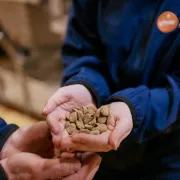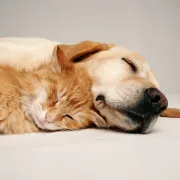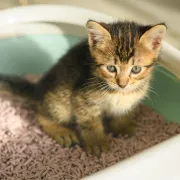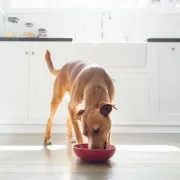Scientific publications
We contribute to the research and dissemination of information about the bond between people and animals.
How Specific Ingredients contribute to dog’s and cat’s health

2005.- Oral supplemented YEAST NUCLEOTIDES IMPROVE THE IMMUNE STATUS OF PUPPIES AT WEANING. Romano et al (2007)
2006.- Polyphenols from CITRUS FRUIT and GREEN TEA in dogs improve antioxidant status and modulates gene expression: Torre et al (2006); Salas et al (2009); Mata-Bilbao et al (2007)
2006:- Immunoglobulines from porcine plasma can arrive active at dog & cat dog, and can contribute to gut health . Rodriguez et al (2007), Lynch A (2013)
2007.- Probiotic Lactobacilli bacteria has been isolated from bitche’s milk and evaluate their probiotic effect in vitro. Martin R et al (2010); Sanchez et al (2008)
2011.-Polyphenols from CITRUS FRUITS and CURCUMA improve antioxidant status and inflammatory markers in cats. Leray et al (2011), Jeusette et al (2010)
2011.- Herbal blend to control of gut parasitosis in dogs Salas et al (2012)
2013.- Hop Phytoestrogens are able to control food intake of sterilized cats, but not orally. Backus et al (2013)
2019.- SPIRULINE suplementation enhance vitality in dogs. Salas-Mani et al (2019)
2021.- CRANBERRY fruit helps to control pathogen bacteria in the urinary tract of dogs. Carvajal-Campos et al (2023)
How diet contribute to skin barrier integrity

2006.- A canine skin equivalent has been developed to be used “in vitro” for screening dietary supplements with skin properties. Serra et al (2007)
2011.- A New management diet that contribute to control Canine Atopic dermatitis. Sanchez et al (2011)
Focus on sterilization

2009.- Overweight increase oxidation and inflammatory markers in cats. Jeusette et al (2009)
2014.- The changes in Choline metabolism and hepatic lipid profile with sterilization have been analyzed. Valtolina et al (2015)
2014.- Effect of sterilization in activity and satiety related hormones in dogs. Schauf et al (2016) and (2017)
2015.- Long term effects of sterilization in body composition and blood markers in cats with high fat or high fiber diets. Jeusette et al (2017)
2022.- Sterilized cats in home fed ad libitum can maintain body weight with a balanced extruded diet with 38 % protein. Higher protein increase water turnover and activity. Goloni eta al (2024)
How diet affects Urinary Health

2016.- A urinary metabolic foot print for Feline urinay disease. Priymenko et al (2017)
2019.- A diet supplemented with fish peptides and L-tryptophan can help to reduce stress in cats. Jeusette et al (2021)
Improving dog & cat oral health

2010.-The more important oral pathogen bacteria involved in periodontal disease in cats had been identified. Perez-Salcedo et al (2011) & (2013) & (2015)
2015.- Feeding an dental treat in dogs effect in the next 24 h. Jeusette et al (2016)
2017.- Daily dental treat reduce tartar, plaque and halitosis in toy dogs. Mateo et al (2020)
Articular Care

2011.- Relation of vitamin K markers and Cartilage markers in osteoarthritis dogs. Salas-Mani et al (2012)
Improving wellbeing of dogs & cats with aging

2014.- Old cats have low levels vit B12 and low fat digestibility. Salas-Mani et al (2014)
2018.- Oral supplementation of vit B12 is effective in improving subnormal cobalaminaemia. Salas et al (2018)
2016.- Antioxidant status, cognitive performance and adaptation in aging dogs. Salas et al (2016)
2021.- How age impact in gut microbiota in dogs and cats. Fernandez-Pinteño et al (2024)
Gut Microbiota & health

2017.- High fat diets affect negatively dogs gut microbiota. Schauf et al (2018)
2016.- Targeting Gut Microbiota for weight loss diets in dogs and cats. Salas-Mani et al (2018) and Jeusette et al (2018 and 2019)
2014.- Fermentable fibers supplementation can help to spare aminoacids in a low protein-diet. Wambacq et al (2016)
2021.- Supplemented diets with fibers from cereals or fruits modulate gut microbiome, digestion and immune status in dogs. Montserrat-Malagarriga et al (2024)
2022.- Supplemented diets with prebiotics, probiotics and fibers contribute to optimize gut microbiome in dogs. Montserrat-Malagarriga et al (2024)
Bibliography
- Goloni, C. et al. High starch intake favours bodyweight control in neutered and spayed cats living in homes fed ad libitum. Br. J. Nutr. 1–47 (2024).
- Montserrat-Malagarriga, M. et al. The Impact of Fiber Source on Digestive Function, Fecal Microbiota, and Immune Response in Adult Dogs. Animals 14, 196 (2024).
- Carvajal-Campos, A. et al. Adherence of uropathogenic Escherichia coli in dog urine after consumption of food supplemented with cranberry (Vaccinium macrocarpon). J. Vet. Res. 67, 49–54 (2023).
- Fernández-Pinteño, A. et al. Age-associated changes in intestinal health biomarkers in dogs. Front. Vet. Sci. 10, 1213287 (2023).
- Jeusette, I. et al. Evaluation of a new prescription diet with lemon balm, fish peptides, oligofructose and L-tryptophan to reduce urinary cortisol, used as a marker of stress, in cats. J. Vet. Behav. 42, 30–36 (2021).
- Mateo, A. et al. Evaluation of Efficacy of a Dental Chew to Reduce Gingivitis, Dental Plaque, Calculus, and Halitosis in Toy Breed Dogs. J. Vet. Dent. 37, 22–28 (2020).
- Schauf, S. et al. Effect of dietary fat to starch content on fecal microbiota composition and activity in dogs. J. Anim. Sci. 3684–3698 (2018).
- Salas-Mani, A. et al. Fecal microbiota composition changes after a BW loss diet in Beagle dogs. J. Anim. Sci. 96, 3102–3111 (2018).
- Schauf, S. et al. Effect of feeding a high-carbohydrate or a high-fat diet on subsequent food intake and blood concentration of satiety-related hormones in dogs. J. Anim. Physiol. Anim. Nutr. 21–29 (2017).
- Valtolina, C. et al. Sex specific differences in hepatic and plasma lipid profiles in healthy cats pre and post spaying and neutering: relationship with feline hepatic lipidosis. BMC Vet. Res. 13, 231 (2017).
- Jeusette, I. et al. 24-hour evaluation of dental plaque bacteria and halitosis after consumption of a single placebo or dental treat by dogs. Am. J. Vet. Res. 77, 613–619 (2016).
- Schauf, S. et al. Effect of sterilization and of dietary fat and carbohydrate content on food intake, activity level, and blood satiety–related hormones in female dogs. J. Anim. Sci. 94, 4239–4250 (2016).
- Wambacq, W. et al. Fermentable soluble fibres spare amino acids in healthy dogs fed a low-protein diet. BMC Vet. Res. 12, 130 (2016).
- Valtolina, C. et al. No up-regulation of the phosphatidylethanolamine N-methyltransferase pathway and choline production by sex hormones in cats. BMC Vet. Res. 11, 280 (2015).
- Salas, A. et al. Fat digestibility is reduced in old cats with subnormal cobalamin concentrations. J. Nutr. Sci. 3, e62 (2014).
- Backus, R. C., et al. Food intake modulation by hop phytoestrogen (PE) in overweight neutered cats. FASEB J. 27, 345.2-345.2 (2013).
- Pérez-Salcedo, L. et al. Isolation and Identification of Porphyromonas spp. and other Putative Pathogens from Cats with Periodontal Disease. J. Vet. Dent. 30, 208–213 (2013).
- Mani, A. S. et al. Relation between plasma vitamin K and bone and cartilage markers in osteoarthritic dogs. FASEB J. 26, 650.2-650.2 (2012).
- Pérez-Salcedo, L. et al. Comparison of two sampling methods for microbiological evaluation of periodontal disease in cats. Vet. Microbiol. 149, 500–503 (2011).
- Leray, V. et al. Effect of citrus polyphenol- and curcumin-supplemented diet on inflammatory state in obese cats. Brit. J. Nutrition 106, S198–S201 (2011).
- Leray, V. et al. Curcuma or citrus extract supplementation does not improve body condition nor insulin sensitivity in obese cats. FASEB J. 24, 725.2-725.2 (2010).
- Jeusette, I. et al. Effect of breed on body composition and comparison between various methods to estimate body composition in dogs. Res. Vet. Sci. 88, 227–232 (2010).
- Jeusette, I. et al. Effects of consuming diets containing various fats or citrus flavanones on plasma lipid and urinary F2-isoprostane concentrations in overweight cats. Am. J. Vet. Res. 71, 1039–1044 (2010).
- Salas, A. et al. Plant polyphenol intake alters gene expression in canine leukocytes. J. Nutr. Nutrigen. 2, 43–52 (2009).
- Rodriguez, C. et al. Porcine immunoglobulins survival in the intestinal tract of adult dogs and cats fed dry food kibbles containing spray-dried porcine plasma (SDPP) or porcine immunoglobulin concentrate (PIC). Anim. Feed Sci. Tech. 139, 201–211 (2007).
- Torre, C., et al. Bovine Colostrum Increases Proliferation of Canine Skin Fibroblasts 1, 2. J. Nutr. 136, S2058–S2060 (2006).